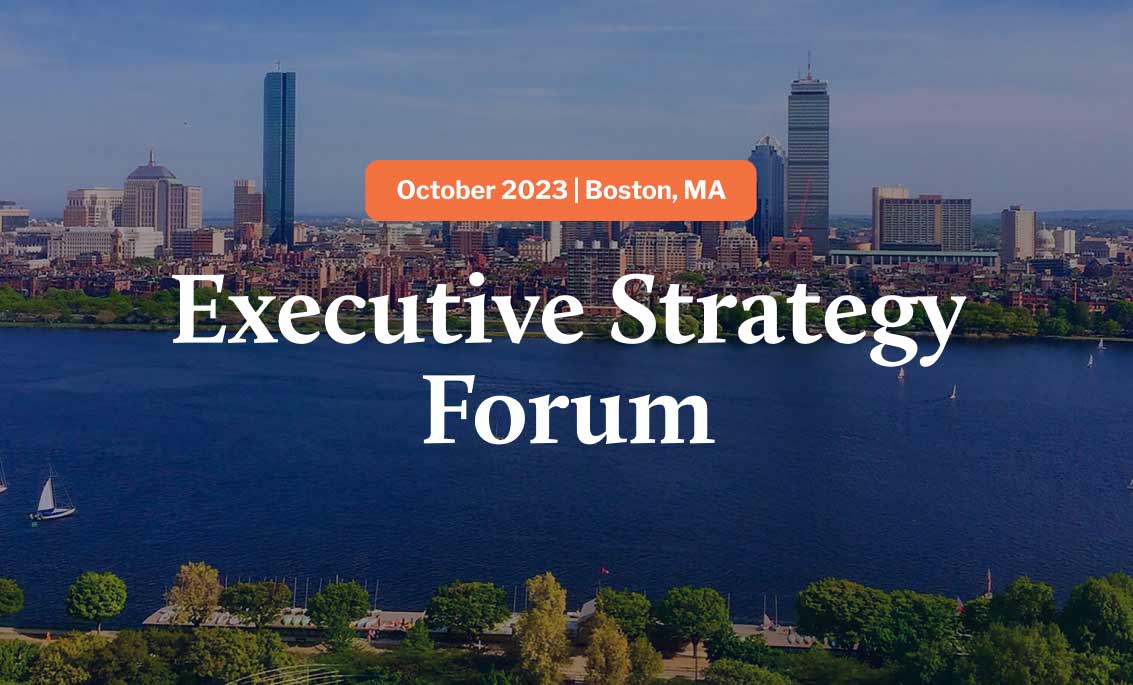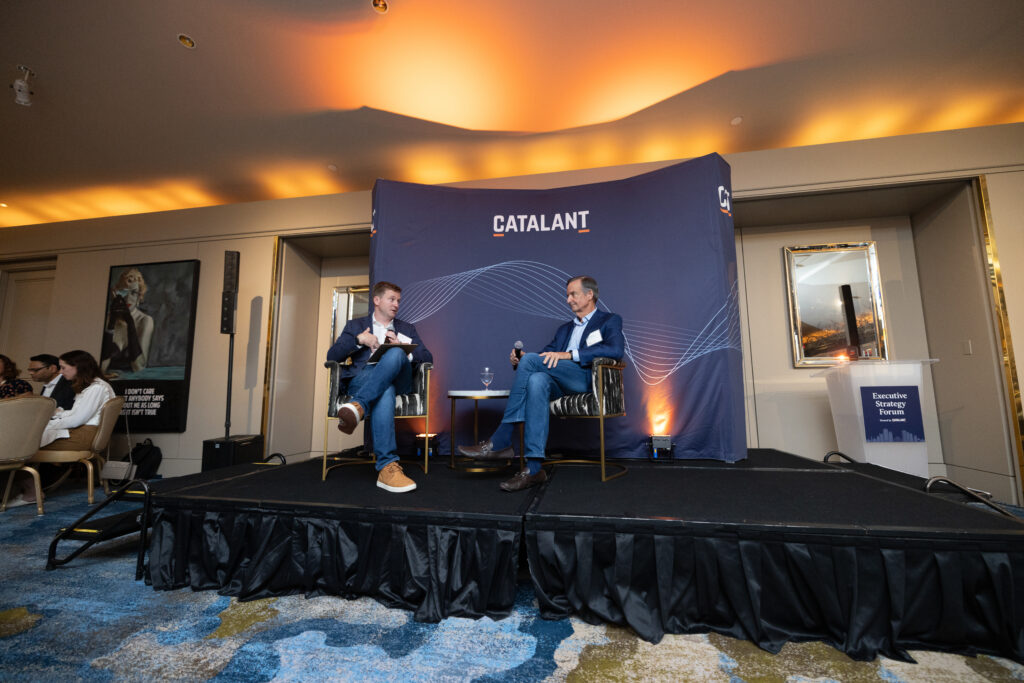Maintaining Strategic Resiliency: Key Learnings from the Executive Strategy Forum

In today’s business climate, it is more important than ever for corporations, private equity firms, and consulting firms to build strategic resiliency. To be successful, leaders must be agile and forward-thinking, and they must also be able to drive results through periods of constant change.
At Catalant’s recent Executive Strategy Forum, over 60 VP and C-level business leaders — including Catalant customers, advisors, and partners — came together to discuss these issues and more. This article covers the top learnings from the session.
Our headline speaker was Mark Nunnelly, Chairman, Toolbox Holdings and Foundation. Mark was Managing Director at Bain Capital for over 30 years and head of their private equity business, and prior to that, was a Partner at Bain & Company where he met our esteemed host, Bill Achtmeyer. Bill is the Founder, Chairman, and Managing Partner at Acropolis Advisors, which he founded with Michael Porter. Prior to Acropolis Advisors, Bill was the founder and Manager Partner of The Parthenon Group, which merged with Ernst and Young in 2014. Mark and Bill joined Catalant CEO and Co-founder, Pat Petitti, in leading insightful discussions on a range of topics, including:
- The state of the current business climate
- How companies can adopt future-ready practices
- The role of technology in business
Let’s get into the top learnings.

Embrace a new normal, not back to normal
First off, business leaders should come to terms with the fact that while the turbulence of the pandemic years has calmed, too much has changed to ever return to what we could point to for 30 years as “normal.”
What’s happening now isn’t a natural business cycle, and we shouldn’t think about it that way. What we’re experiencing is a secular change, a change in the economy or business climate that develops over a long period of time.
So, what should be at the forefront of a leader’s mind today?
- If you think you’re not in the technology business, think again
- Innovation will be a significantly greater part of whatever set of decisions you’re making than it ever has been
- You must be equipped to manage a workforce that can adapt to constant change
Speed and talent are really important parts of the equation. It is very challenging to onboard and successfully integrate the talent that you need today to adapt to the constant change. Companies need new, dynamic models for getting the skills and expertise required.
Hire to the trough, variablize to the peak
A question in reflection at the session was:
Am I ready as an organization to reimagine how I go to market and relate to my customers, using technology in a way that I’ve never embraced before? Do I have the skill set internally to adapt to the change quickly?
Mark and Bill noted that they have both made careers of hiring people who (according to them) are infinitely more talented than they are. Doing that successfully raises the premium for the quality of the people put on a team. It raises the standard around how much you have to empower them and create systems around which you can manage in a more virtual world.
One strategy to consider is “hiring to the trough and variabilizing to the peaks.” Joe Fuller, HBS professor, and co-lead of the Managing the Future of Work Project, started talking about this in 2020, and we’re seeing alignment to it among the executives we speak with, more today than ever before. Because it’s easier now to find “just-in-time” knowledge workers, organizations can formalize a hybrid talent model that incorporates core FTE hiring and variabilized talent on demand.
As Pat noted, 10 years ago, Catalant introduced an approach that has evolved to what we now call Consulting 2.0. It’s a fast and easy way to find outside freelance expertise that has solved your specific problem before. Consulting 2.0 unbundles traditional consulting, allowing it to be more accessible across the organization, and a more flexible and cost-effective solution. It’s no longer enough for smart, yet inexperienced, people to learn how to solve a problem on a client’s dollar – an often criticized feature of traditional consulting’s model. Organizations today need faster access to experienced talent – the kind who’ve sat in operating seats and know how to move quickly.
Bill has seen the need to source outside expertise firsthand over his 40 years as a trusted advisor to the top CEOs in the Fortune 100. He’s had a unique vantage point to seeing the shift in how the need for outside expertise is critical, yet changing. He realized that in order to best serve C-suite executives in a strategic advisory capacity, he benefitted from tapping into a global network of trained consultants with specific industry expertise.
To that end, earlier this year, Catalant and Acropolis Advisors formed a strategic alliance. Our partnership is a unique business model innovation that combines the best strategic advisory talent with highly skilled independent consultants to offer C-suite advisory services.
3 characteristics that CEOs need now
The natural next question is, what do successful CEOs look like today? According to Bill, the best CEOs today share three qualities that enable them to lead through periods of constant change.
- Maniacal realism. It’s ok to be visionary, but you also need to be a realist. CEOs today have to be open to hearing contrarian points of view. They need to be open to getting information that they may not like. That means they cannot solely rely on people that they’re comfortable with, data sources they’re comfortable with, or only an inner circle. They need to listen to external perspectives.
- Tenacity. A lot of companies live in a world of satisfactory underperformance. Leaders today cannot sit in that place. A tenacious leader has energy, constantly innovates, and doesn’t sit in the status quo.
- Radical candor, with heart. As Jennifer Morgan, Blackstone’s Global Head of Portfolio Operations and former Co-CEO of SAP, shared with us at an event earlier this year, the most effective leaders must have empathy and lead with heart, but be radically candid. When you take the fear out of an environment and create a culture of bringing challenges to the table before they become full-blown problems, you can experience radical candor – with heart.
The children are our future
For some, it may feel like we’re headed into doomsday, but execs in the room felt confident the younger generation will solve many of the problems we have today (and, to be fair, will probably create new ones that the generation following will need to solve).
All speakers agreed that there’s an energy and commitment present in the younger generation that we need to figure out a way to tap into.
A lot of the job of a leader today is to appreciate that potential, rather than groan that the younger generation wants to work virtually or say that all they talk about is work-life balance. We’ve got to approach the conversation in a different way and meet them where they are because for now, this isn’t going to change.
When asked what our children should be focused on, Mark shared a quote that resonated with audience members:
Mamas, don’t let your babies grow up to be anything but data scientists.
It’s a nod to the fact that data continues to be a valuable resource to companies globally, and, as previously mentioned, all companies are technology companies in some way today. The future of so many different disciplines and approaches is going to be tied up in the ability to take new tools and problem-solve with rich and informed new sets of data. Being conversant in that language is going to be incredibly important for the next generation.
Amplify with AI, not replace
The conversation naturally included a discussion on generative AI and its impact on business today. Current sentiment is – AI tools are helpful in assisting and speeding up certain tasks. But they haven’t fully evolved to replace humans in all tasks (but check again in a few months, innovation here is moving at lightning speed).
We discussed the recent study out of Harvard Business School, in partnership with Boston Consulting Group, which examined the performance implications of AI on realistic, complex, knowledge-intensive tasks in consulting. The results suggest that the capabilities of AI are still quite variable, with some tasks being well-suited to AI, and others less so. For tasks well-suited to using AI, consultants were significantly more productive and produced significantly higher quality results (more than 40% higher quality compared to the control group of consultants not using AI). In contrast, for tasks of the same difficulty, but less suited to AI’s capabilities, using AI lowered the consultant’s ability to correctly do the task.
One skill most agree will continue to be valuable in an AI-centric business world is the ability to build relationships. Roles like sales, where human relationships are key, will continue to be important in a more sophisticated AI environment.
Join us at the next Executive Strategy event
We covered quite a bit of ground in this recap but did not detail all conversation points here in order to keep an off-the-record atmosphere for more sensitive topics. The Executive Strategy event series is an amazing opportunity to discuss the most pressing issues facing business leaders today and see trends revealed from Catalant’s aggregated data. Every month, we gather with executives in local markets to have these in-depth conversations. Request an invitation to our next session at the link below.